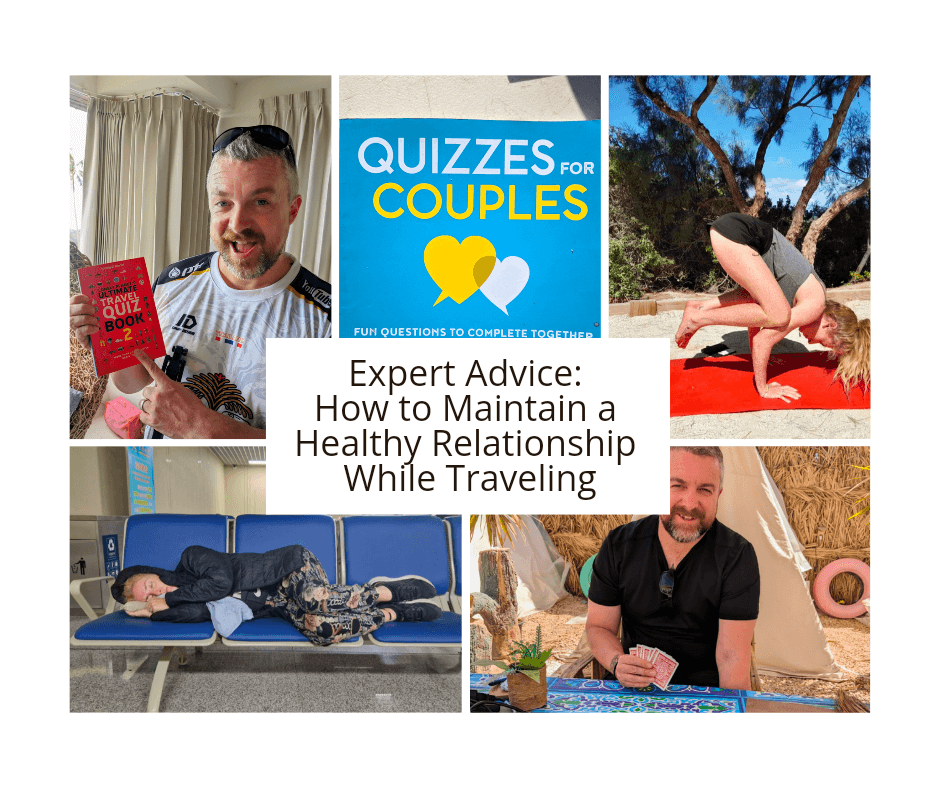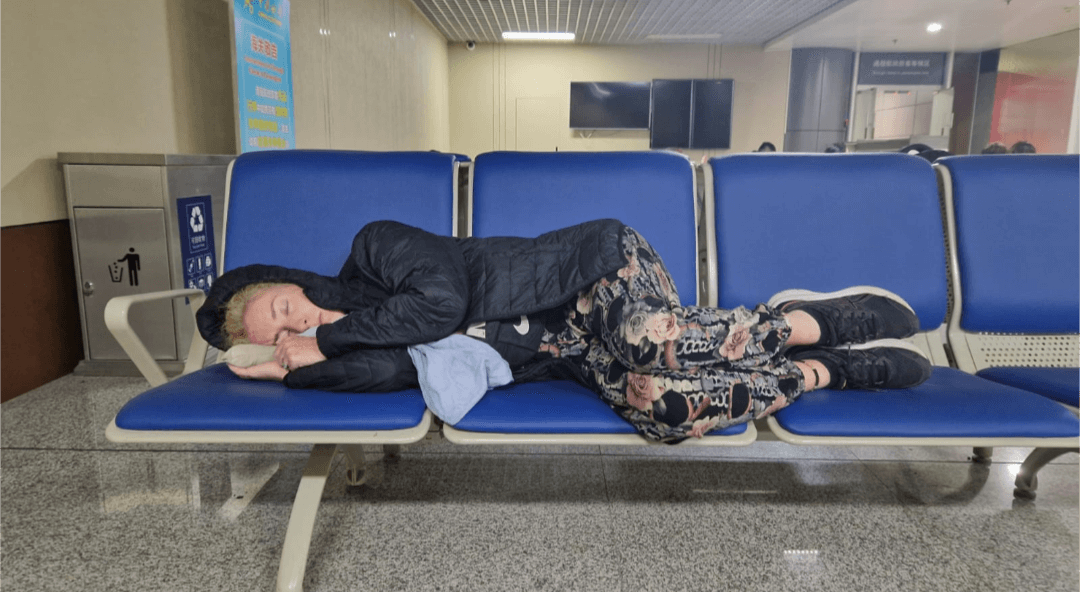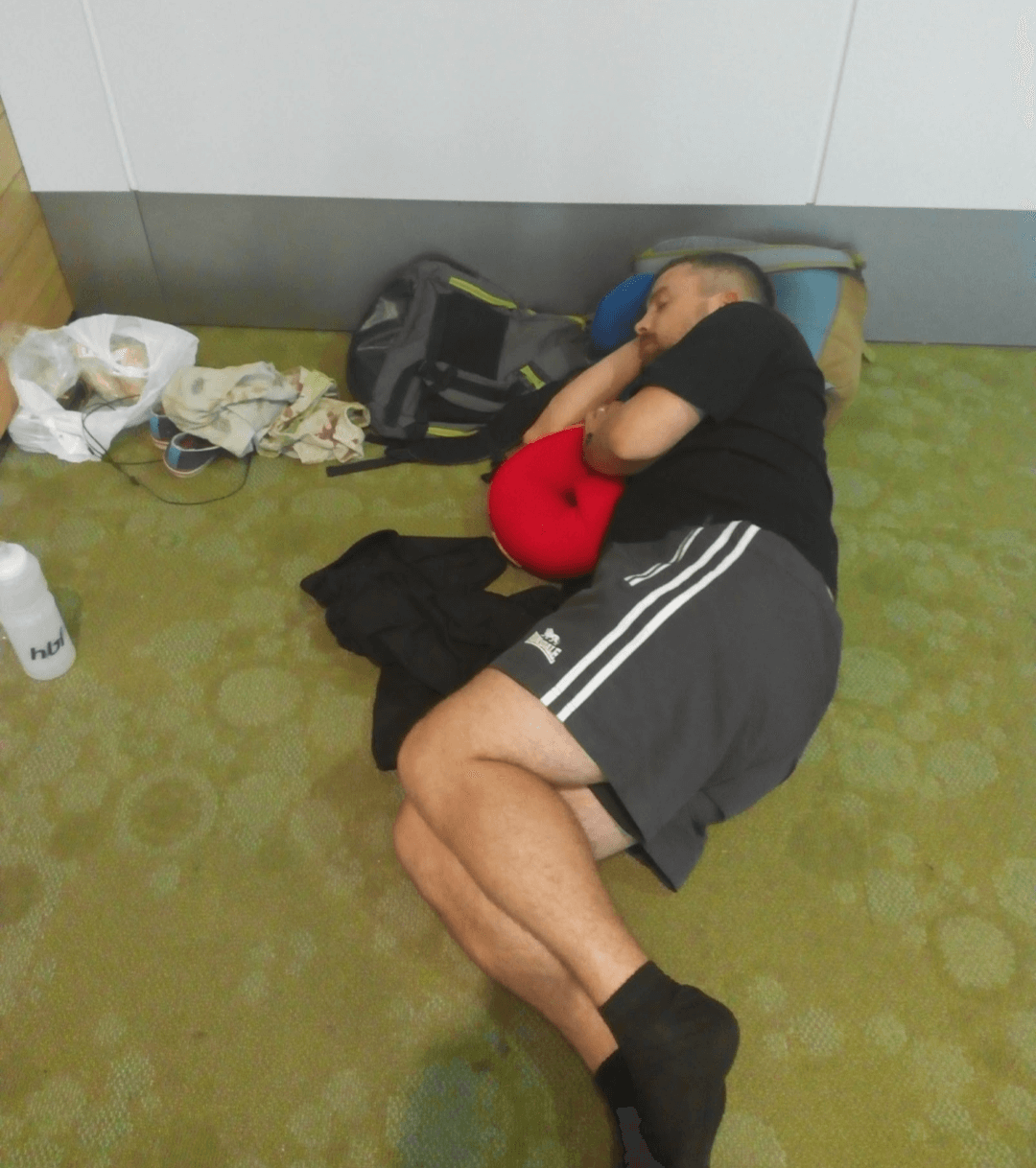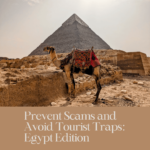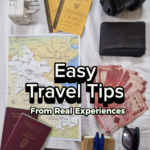Last updated on January 17th, 2025 at 02:27 pm
Not only is Kate from Happy Irish Wanderers a qualified Counsellor but at the time of writing we have been traveling full-time as a married couple for over 3 years. Let’s just say we know a thing or two.
During this time, we’ve navigated relationship conflicts and worked to maintain a healthy relationship while traveling. At times, we manage well, and at other times, not so much!
One common question we receive is, “Don’t you argue?” The simple answer: Of course we do!
Arguments are a natural part of any healthy relationship. However, they can take on a different dynamic when you’re constantly together, basically living in each others’ pockets, enduring endless bus journeys, without the usual breaks of personal space, hobbies, friends, or family and so much more that helps to take the pressure off couples.
With a Master’s degree in Counseling Psychology and extensive experience in the field, I will tackle this sensitive and often overlooked topic by offering expert advice grounded in research, while also sharing our personal challenges and strategies for resolving conflicts when traveling as a couple.
Maintaining a healthy relationship while traveling is a massive topic and can sprawl into a plethora of different discussions, therefore, I will keep this as brief as possible while covering the main learnings. Furthermore, I’ll suggest extra reading on specific topics if you’d like to explore them deeper. Feel free to reach out if you have any questions or need more information.
Important Information to Note
Conflict can be healthy when it leads to growth, understanding, and resolution, but unhealthy when it causes stress, harm, and unresolved tensions.
Please note the following points are most beneficial when you’re in a nurturing relationship with a supportive partner, not an abusive one.
After reading this guide to relationships and travel, if you’re not experiencing a healthy relationship or if you’re facing abuse, please reach out for help.
USA: The National Domestic Violence Hotline. You can reach them 24/7 by calling 1-800-799-SAFE (7233) or by visiting their website at thehotline.org.
Australia: 1800RESPECT, a national helpline providing confidential support, information, and referrals for people impacted by domestic violence and sexual assault. You can reach 1800RESPECT 24/7 by calling 1800 737 732 or visiting their website at 1800respect.org.au
Ireland: Women’s Aid National Freephone Helpline, which provides confidential support, information, and referrals for women experiencing domestic violence. You can contact Women’s Aid 24/7 by calling 1800 341 900 or visiting their website at womensaid.ie.
UK: The National Domestic Abuse Helpline in the UK can be reached at 0808 2000 247 or through their website at nationaldahelpline.org.uk, providing support for women experiencing domestic abuse.
Before we get into strategies to manage conflict and maintain a healthy relationship while traveling, let’s define exactly what these two terms mean so that we are all on the same page.
What is Relationship Conflict?
Relationship conflict refers to disagreements, disputes, or tensions between two or more individuals. These conflicts can arise due to differing viewpoints, values, expectations, or needs, and they often involve emotional responses from those involved.
Conflict in relationships while traveling, and otherwise, can manifest in various forms, such as arguments, misunderstandings, power struggles, or even silent treatments.
What is a Healthy Relationship?
A healthy relationship is built on effective communication, trust, and mutual respect. Partners support each other emotionally and respect each other’s boundaries and personal space. They share decision-making and strive for equality in the relationship.
Conflicts are handled constructively through open dialogue and compromise, rather than avoidance or domination. Both individuals encourage personal growth and celebrate each other’s successes, creating a supportive and fulfilling partnership where each person feels valued and understood.
Three Core Elements of a Healthy Relationship While Traveling
Maintaining a healthy relationship while traveling can be challenging – understatement of the century right?!
Given my background in psychology, I may have some insights in this area, but that doesn’t mean we have everything figured out while traveling out as a couple or that we always get things right – far from it. However, we can confidently say that we always learn from our mistakes.
We’re here to share our experiences and lessons learned about resolving conflicts and maintaining a healthy relationship, both as a full-time travel couple and as partners in general.
In healthy relationships, effective communication, trust, and mutual respect are interconnected to create a strong and supportive dynamic. Let’s take a look at what these look like as a full-time travel couple.
This travel guide is centered on full-time travel couples, but you can be certain that everything mentioned here can be applied to couples in general.
Communication
The first of the three main foundations of a healthy relationship is communication. Effective communication is vital in navigating this unique lifestyle of travel.
Effective communication allows partners to express their thoughts, feelings, and needs openly and honestly, fostering understanding and trust.
Positive communication will underlie each point mentioned throughout this relationship travel guide, but before we get to them let’s take a look at what effective communication actually looks like in a healthy relationship while traveling:
Active Listening/Attention: Fully listen to your partner’s concerns, and preferences, and offer feedback – we will go into more detail later.
Body Language: Use positive body language/eye contact to show support and understanding.
Clarity/Clear Planning: Discuss travel plans, itineraries, and expectations. Communicate openly with each other about what you want to see, do, and experience in new places, and why it’s important to you, to ensure that you’re both on the same page.
Differentiate: Divide travel-related tasks and share responsibilities to ensure a balanced partnership.
Empathy/Understanding: Recognize and respect each other’s feelings, especially when dealing with travel stress or homesickness while traveling. It is ok to not be ok some days.
Flexibility/Open-Mindedness: Be open to your partner’s ideas and suggestions about travel activities and destinations. One of our go-to sayings as a full-time travel couple is “Plans change, and that’s ok!”
Gain Knowledge and learn: Continuously seek feedback from each other to improve communication. In my opinion, you must never stop learning – about yourself, and your partner – a vital aspect when it comes to maintaining a healthy relationship while traveling.
Haven and Personal Space: Respect each other’s need for personal time and space during travels.
Tone and Language: Use a calm and respectful tone, especially during disagreements or stressful situations, this is vital when it comes to managing conflict during traveling. Arriving at a sketchy bus station at 3 am in an unfamiliar city, unable to locate the accommodation, can be a stressful experience. Trust us, a calm and reassuring tone can work wonders in preventing both individuals from feeling overwhelmed and losing their cool at each other.
To sum up, effective communication helps couples manage conflict while traveling, and navigate the unique challenges of constantly being on the go, ensuring both partners feel heard, valued, and connected.
Trust
Trust is essential in developing a healthy relationship while traveling, providing emotional security, fostering open communication, and strengthening commitment between partners.
Security and Stability: Trust provides emotional security and stability in a relationship, fostering a sense of safety and reducing anxiety.
Communication and Transparency: Trust enables open and honest communication, allowing partners to share thoughts, fears, and aspirations without fear of judgment.
Conflict Resolution and Commitment: Trust supports effective conflict resolution and strengthens commitment by fostering mutual understanding and resilience during challenges
Mutual Respect
Mutual respect is fundamental in fostering understanding, communication, and emotional safety within a relationship, ensuring partners feel valued and supported.
Communication and Understanding: Mutual respect cultivates an environment where partners communicate openly, listen actively, and validate each other’s feelings and opinions.
Conflict Resolution: Respectful relationships handle conflicts constructively, focusing on finding solutions that benefit both partners rather than escalating disagreements.
Support and Autonomy: Respect allows partners to support each other’s growth and individuality while honoring each other’s boundaries and independence.
Can you see how these vital components are all interconnected when it comes to maintaining a healthy relationship while traveling?
These elements of communication, trust, and mutual respect work together to strengthen the emotional connection between partners, foster understanding during challenges, and promote growth and mutual support within the relationship during travel.
Barriers to Effective Communication for Travel Couples
We all know that positive communication is easier said than done at times. However, various barriers can hinder our ability to communicate effectively, leading to misunderstandings and conflicts while traveling
Developing an awareness of some (ideally all) of these barriers can assist in maintaining a healthy relationship while traveling, and can sometimes be the biggest step to overcome.
Let’s explore some common obstacles that can impact our relationship while traveling:
Hunger
Let’s start with an obvious barrier to effective communication during travels, one we have all experienced, often without realizing its impact.
The term “Hangry” has been adopted for a reason folks!
Traveling as a full-time travel couple can sometimes mean you do not always manage to get sufficient food intake, be it long travel days, arriving in a new city late at night, or being in a country during Ramadan!
Whatever the reason, hunger can be a real issue when it comes to relationship conflict while traveling.
But why?
Hunger can play a significant role in relationship conflict while traveling due to its impact on mood, emotions, and cognitive functioning.
When you are hungry, you may experience irritability, difficulty concentrating, and heightened emotional responses, all of which can contribute to conflict within relationships during travel.
Additionally, hunger can amplify existing stressors and disagreements, making it more challenging for couples to communicate effectively and resolve conflicts while traveling.
Self-reflection is key here. Ask yourself “Is hunger the cause of arguments while traveling full-time?” Be honest with yourself and honest with your partner. If you are finding yourself snapping at your partner, and not communicating effectively during travel – could it be that you are hungry?
If so, the good news is that we have an effective remedy. Fancy a burger as a remedy? It’s a win-win really, yummy food and avoiding relationship conflict while traveling!
Make sure to eat regular meals, and always be prepared with snacks at the ready! Not the worst way to maintain a healthy relationship while traveling right?!
Our personal experience
I used to get angry when Kevin would ask “Are you hungry?” or offer me a Snickers when I would get snappy at him. Now, I am completely aware that I will become cranky if I do not eat after certain periods. I’ll have that Snickers thank you very much!

Therefore, to avoid such unnecessary conflict, we make sure to be prepared with extra snacks and plan for such events as bus breakdowns, and any other travel delays that may occur. And who doesn’t like extra snacks?
This is not always possible of course, but it is working a treat so far – pun intended!
Hunger can be a real issue when it comes to relationship conflict for full-time travel couples, let’s not add fatigue to the mix shall we?!
Fatigue
Full-time travel may get promoted as living your best life with a cocktail in hand watching the sunset on a pristine beach of a paradise island. This is not always the case, for us anyway!
Full-time travel also entails long travel days, navigation, backpack lugging, back-breaking buses, confusion, scamming, negotiating, uncertainty, and uneasiness. All the ingredients to make maintaining a healthy relationship while traveling a breeze…….
But why?
Fatigue can also significantly impact relationships by lessening patience, increasing irritability, and weakening communication, and problem-solving abilities.
When you are tired, you may have reduced energy levels and decreased resilience, making it more challenging to manage disagreements, and effectively resolve conflicts while traveling.
Additionally, tiredness can contribute to misunderstandings and escalate minor issues into larger conflicts within relationships. Therefore, prioritizing rest, self-care, and open communication about fatigue levels can help couples better manage conflict during travels.
We’ll address what self-care can look like for couples while traveling later in this article.
Yes, in this “healthy relationship while traveling” guide I am referring to full-time travel couples, however, these can be applied easily to work schedules, extra-curricular activities, training, kids’ routines, workload….the list is endless.
Hormones
You can practice all the mindfulness you like, and be getting on wonderfully, and suddenly get hit sideways by hormones.
The menstrual cycle can influence relationship conflict in various ways due to hormonal fluctuations and the associated physical and emotional changes experienced.
But why?
Here are key aspects of how hormones can affect a healthy relationship while traveling:
Mood Swings: Hormonal changes during the menstrual cycle can lead to mood swings, irritability, and emotional sensitivity. These fluctuations may increase the likelihood of conflicts arising over minor issues, as individuals may react more strongly to stressors or disagreements.
Communication Challenges: Women may find it more challenging to communicate effectively during certain phases of their menstrual cycle, particularly during premenstrual syndrome (PMS) or menstruation itself. This can lead to misunderstandings, frustration, and escalating conflicts with their partners.
Increased Stress Sensitivity: Hormonal changes can heighten sensitivity to stressors, making individuals more prone to feeling overwhelmed or anxious. This heightened stress response may exacerbate existing relationship conflicts or make it more difficult to resolve disagreements calmly.
Physical Discomfort: Menstrual symptoms such as cramps, fatigue, and headaches can impact individuals’ comfort levels and overall well-being. Dealing with physical discomfort may reduce patience and tolerance for relationship conflicts, potentially leading to increased tension.
Self-Perception and Self-Esteem: Hormonal fluctuations can affect self-perception and self-esteem, particularly during the premenstrual phase. Negative self-perceptions or feelings of insecurity may influence how individuals perceive and respond to relationship conflicts, potentially contributing to heightened sensitivity or defensiveness.
Coping Strategies: Individuals may employ different coping strategies during their menstrual cycle to manage emotional and physical symptoms. These coping mechanisms, such as seeking solitude or withdrawing from conflict, can impact how conflicts are addressed within the relationship.
Partner Responses: Partners may also play a role in how menstrual cycle-related conflicts unfold. Understanding and supportive partners may adjust their communication styles and offer extra support during challenging times, while insensitive or dismissive responses can escalate conflicts further.
By taking the time to educate ourselves about this important topic, we both take responsibility for fostering understanding and support within our relationship.
Our personal experience
Personally, I was never taught how menstruation and hormones affect me and my relationships. This topic was overlooked in our education system, but fortunately, it’s gaining more attention now.

I take responsibility by researching the topic of menstruation, tracking my cycle, and logging my symptoms on apps such as FLO.
These practices enhance my self-awareness and deepen my understanding of my body and emotions. As a result, I can effectively communicate these insights to my partner, helping him better understand my experiences.
Without conducting research and investing time to understand my own experiences, I can’t reasonably expect my partner to offer understanding.
It is our responsibility to actively educate ourselves and foster awareness about this important topic, which may have been neglected or insufficiently addressed during our upbringing.
Further reading: The most recommended book for educating on menstruation and hormones is often “Period Power: Harness Your Hormones and Get Your Cycle Working For You” by Maisie Hill. This book is widely praised for its comprehensive, accessible, and practical approach to understanding and optimizing menstrual health and hormonal balance.
Tips for Enhancing a Healthy Relationship While Travelling
Now that we’ve identified obstacles to managing conflict and sustaining a healthy relationship while traveling, let’s explore strategies to overcome these challenges.
Show Interest in Your Partner’s Interests
Showing genuine interest in your partner’s interests is crucial for maintaining a healthy relationship during travel.
But why?
Here are key aspects of how showing interest in your partner’s interests can nourish a healthy relationship while traveling:
Building Connection: Taking an interest in your partner’s hobbies and passions helps strengthen the emotional bond between you. It shows that you value their individuality and want to share in their experiences, fostering a deeper connection while traveling.
Enhancing Communication: Engaging in conversations about your partner’s interests provides opportunities for meaningful communication. It allows you to learn more about each other’s likes, dislikes, and perspectives.
Mutual Support: By showing interest in your partner’s interests, you demonstrate your support for their goals and aspirations. Whether it’s attending their events, cheering them on, or offering encouragement, your involvement can boost their confidence and motivation.
Creating Shared Experiences: Exploring your partner’s interests together can lead to new shared experiences and memories. Whether it’s trying out a new hobby, attending events, or simply discussing common interests, these shared moments strengthen your bond as a couple.
Fostering Respect: Taking the time to understand and appreciate your partner’s interests demonstrates respect for their individuality and autonomy. It shows that you value their passions and are willing to invest in their happiness.
Promoting Balance: Encouraging each other to pursue personal interests helps maintain a healthy balance between individuality and togetherness in the relationship. It ensures that both partners have opportunities for personal growth and fulfillment outside of the relationship. In my experience, it is essential to nourish and encourage personal growth within the relationship while traveling as a couple, given that you are in each other’s pockets so much of the time.
Sparking Excitement: Sharing enthusiasm for each other’s interests can inject excitement and energy into the relationship. It keeps things fresh and dynamic, preventing complacency and boredom while traveling.
Our personal experience
Kevin often asks if I want to do a quiz with him, watch the “Top 10 football goals,” or kick a ball outside – activities I more than likely have zero interest in.
Instead of huffing and counting the minutes until it’s over, I shift my perspective to appreciate that he wants to share these moments with me. I put down what I’m doing and give him my time.
Showing interest in his interests leads to further in-depth conversations and thus further connection in our relationship while traveling. I ask him about what he likes about the video, where this interest came from, what’s is his first memory of this interest, who introduced him – the options are endless.
It’s just the two of us now, and I’m the person he wants to share these little joys with. Focusing on that makes all the difference.
Play – Have a Bit of Craic!
For those not from Ireland, Craic means fun!
This is an important point.
With full-time travel, couples can get inundated with planning and researching. There is a lot of serious thinking happening – itineraries, schedules, transport times, language barriers, hotel locations, the list is endless and these can have major consequences on maintaining a healthy relationship while traveling.
Incorporating play into your full-time travel relationship is crucial for maintaining energy and connection during travel.
But why?
Playfulness fosters laughter, spontaneity, and shared enjoyment, which are vital for bonding and relieving stress.
We need to give ourselves and our brains a break. Nourish our relationship and our inner child by being silly, and taking time out to play during travel.
Being playful can come in many forms: card games, puzzles, frisbees (or whatever can fit into your backpack!), learning tricks, yoga, new dance moves, engaging in playful banter, drawing each other, drawing on each other, asking questions like what animal would each other be, get creative or simply enjoy each other’s company.
Not sure which play suits you yet, not a problem, try them all to find out!
Get off the phone (or laptop, ahem!) and keep the spark alive.
I know this is terrible homework to get, but go have fun together.
Our personal experience
We are avid card players as our way of taking time out and maintaining connection during full-time travel. We also have a travel quiz book that we like to test each other with – although this can turn serious pretty quickly!
We have certain TV shows downloaded that if one of us watched without the other there would be trouble! We organize our schedules to ensure we finish work on time so we can enjoy meals together, followed by an evening walk to chat and reflect on the day.
Ok, having fun and playtime doesn’t really sound like it is a problem for us, but we did work hard to get to this point. Now, luckily, we can reap the rewards of that hard work.
Check out what a day looks like for us as a couple during our full-time travel. Can you see the times when we make an effort to nourish our relationship while traveling?
Stop Assuming
A significant source of conflict in relationships while traveling is making assumptions, something we all do.
It’s crucial not to assume or speculate about what the other person thinks, feels, or intends.
As you read through the below points, reflect on which ones you could improve on.
But why?
Here are key aspects of how presuming influences a healthy relationship while traveling:
Miscommunication: Assumptions may lead to misunderstandings, where partners interpret each other’s actions or words incorrectly.
Conflict: Biases can fuel disagreements and arguments if one partner assumes the other’s intentions or feelings without clear communication.
Lack of Connection: When assumptions replace open dialogue, partners may feel misunderstood or unappreciated, weakening the emotional bond between them.
Resentment: Persistent assumptions can build resentment over time if they result in repeated misunderstandings or unmet expectations.
Barriers to Growth: Personal biases can limit personal and relational growth by preventing partners from truly understanding and supporting each other.
Presuming about the other person’s actions, thoughts, reactions, anything really, can develop into quite an unhelpful habit.
Let’s look at ways to start to break this toxic habit and the first part begins with awareness: becoming aware that you are making assumptions of the other person.
Mindfulness: Stay mindful of biases and assumptions, reflecting on your thoughts and behaviors regularly.
Open Dialogue: Regularly communicate about preferences and feelings, listening attentively without assuming.
Practice Empathy: Understand your partner’s perspective and validate their experiences.
Avoid Assumptions: Clarify assumptions with questions.
Share Insights: Be open about your own preferences.
Reflect and Adjust: Learn from past misunderstandings, adjusting behaviors based on feedback.
Seek Feedback: Encourage honest communication and create a safe space for sharing thoughts.
Engage in Joint Activities: Participate in activities together to understand each other’s reactions better.
Our personal experience
For us, assuming what the other person in the relationship was thinking or meaning was a big source of relationship conflict during traveling.
We still find ourselves having to look over the list above to stop ourselves from reverting back to the all-to-familiar habit of assuming.
Catching ourselves assuming and developing our awareness when we jump to biased conclusions proved to be half the battle. Now we (mostly) aim to clarify what the other person is saying or meaning.
For us, this small adjustment of clarification has lessened relationship conflict during travel substantially.
Mental Health
Mental health is foundational to all aspects of a healthy relationship while traveling, and of course, in general. It affects how partners interact, support each other, and navigate the challenges that arise with relationships during travel.
But why?
Here are key aspects of how mental health influences relationship dynamics while traveling:
Emotional Regulation/Managing Emotions: Good mental health allows individuals to manage their emotions effectively. This helps in avoiding overreactions and managing stress, which can reduce conflicts and promote a calm and supportive relationship during travel.
Communication: Mental well-being supports clear and open communication. When both partners are mentally healthy, they are better equipped to express their thoughts, feelings, and needs clearly and listen to each other without misunderstandings.
Empathy and Understanding: Good mental health enhances the ability to empathize with a partner’s feelings and perspectives. This understanding fosters deeper connections and mutual support.
Conflict Resolution: Mentally healthy individuals are better at resolving conflicts constructively. They can approach disagreements with a problem-solving attitude rather than escalating tensions.
Providing Support: When both partners are mentally healthy, they can provide better emotional support to each other. This includes being attentive to each other’s needs and offering help when one partner is facing challenges.
Building Trust: Mental health contributes to a sense of security and trust in a relationship. When both partners are emotionally stable, they can build and maintain trust more easily, which is foundational for a healthy relationship.
Intimacy and Connection: Mental well-being supports physical and emotional intimacy. Feeling mentally well can increase the desire for closeness and improve the quality of intimate interactions.
Self-Esteem and Confidence: Good mental health fosters positive self-esteem and confidence. This allows individuals to engage in relationships from a place of self-worth, contributing to healthier interactions and mutual respect.
Stress Management: Mental health equips individuals with better-coping mechanisms for stress. When stress is managed well, it reduces the negative impact on the relationship.
Personal Growth: Mentally healthy individuals are more open to personal growth and adapting to changes within the relationship. This adaptability is important for the long-term success of any relationship.
Prioritizing mental health – through self-care, therapy, and open communication about mental well-being – can significantly enhance the quality and stability of a relationship while traveling.
Your well-being must come first for your relationship to thrive.
Looking after and understanding your own mental health unpins every point mentioned in this travel relationship guide.
Our personal experience
During my training as a psychologist, which included mandatory therapy for myself, I gained valuable insights into my mental health. However, embarking on full-time travel as a couple introduced a completely new learning experience.
Beginning full-time travel brought a lot of uncertainty, which in turn, brought new anxieties for me. I concentrated on understanding my anxiety triggers while traveling, which helped me gain insight into my fight-or-flight responses.
Occasionally, my anxiety resurfaces. In the past, I’d often attempt to conceal and suppress such uncomfortable emotions, refusing to acknowledge anxiety’s presence. How do you think this went…….
Yeah, you guessed it, it went down like a lead balloon!
The attempt to ignore these warning signs from my body was simply wasted energy. Energy that could have been put to much better use, toward understanding and soothing my anxiety, but instead left me completely depleted, and vulnerable to, you guessed it, arguments.
Unsurprisingly, as a full-time travel couple, Kevin got the brunt of this internal battle, and of course, completely unaware of where these outbursts had come from.
Nowadays, instead of wasting energy hiding my anxiety, I acknowledge it as a natural protective response. I communicate openly with Kevin when I feel anxious, whether or not I understand its cause.
After much time getting to know my anxiety I realize that big hikes, travel days, plane journeys, and being late, are my triggers. Yes, you read that correctly, a lot of important factors in full-time travel!
Recognizing these triggers allows me to be gentler with myself on challenging days, practicing self-compassion. Kevin has since gained awareness of what is going on for me, he is brought into the loop, and can now support me a little bit more with this new knowledge.
The specific reason for my anxiety isn’t always crucial at first; what matters is my self-awareness, acceptance of anxiety, and open communication with Kevin.
Sometimes he doesn’t have to do anything, just communicating the experience of anxiety alone can have immediate relieving effects. This will be addressed more in the active listening section where he allows me to vent, and responds with a compassionate “That sounds awful, are you ok?”
Kevin doesn’t need to say anything or “fix” things or make me “better”. Oh please don’t do that! He listens and accepts where I am, he might ask if I need anything, which either leads to one of two responses “No, I’m good, I just wanted to let you know” or “Yeah can I just get a hug please”. I feel heard, understood, loved unconditionally, and accepted as I am – not bad buffers to feeling anxious.
Now that Kevin knows what’s happening with me, I feel more at ease, allowing me more space to prioritize self-care – a crucial aspect of managing my anxiety.
Acceptance and Commitment Therapy is my preferred approach for managing anxiety. While I could discuss anxiety at length, if you’re interested in learning more about this theory, I highly recommend reading The Happiness Trap. ACT is a form of cognitive-behavioral therapy that emphasizes acceptance of difficult thoughts and emotions, mindfulness, and commitment to actions aligned with one’s values.
Mind Yourself
Did you know that in Ireland we say “mind yourself” when leaving someone’s company? How lovely is that?
Just like any other aspect of a relationship, your partner can’t support you effectively unless they understand what you’re going through. This realization took time for me.
Take the time to understand your own mental health. Whether it’s anxiety, depression, eating disorders, substance abuse, or any other challenge, educate yourself, attend therapy, develop self-awareness, and learn about your triggers.
Share your journey and insights with your partner. Communication is key to fostering understanding and support in your relationship while traveling.
Stress Management
As you can imagine, managing stress together is essential for maintaining a healthy relationship during traveling.
By supporting each other during challenging times, couples can reduce tension and strengthen their bond. Whether it’s through active listening, offering reassurance, or finding relaxation techniques to practice together, mutual stress management fosters a healthy relationship during travel.
Each and every one of us has our own stress-coping strategies. And getting to know ours was essential in our journey to maintaining a healthy relationship while traveling.
Our personal experience
What have we learned?
Well, Kevin needs space, whereas, I crave closeness. So how do we handle this during arguments while traveling?
For a long time, not very well.
Time to set boundaries.
Boundaries is not about separation. Boundaries is about holding on to yourself in the presence of another and staying connected to another without losing yourself.
Esther Perel
We needed to manage boundaries and agree on how to handle situations where one might need more space or time alone.
After numerous prolonged and emotional arguments during travel, we finally began to deeply explore our individual experiences during times of stress and conflict.
We learned that when Kevin used to walk away during arguments, instead of assuming he didn’t care enough to stay, I now understand through communication that he needs space to self-soothe.
We post about our life and our relationship on a daily basis on our stories on social media, therefore, to get a real insight into how we manage our relationship while traveling full-time make sure to give us a follow.
Kevin would also sleep, like proper lights-out sleep, during arguments while traveling. As you can imagine, for the person who needed closeness and communication, this used to drive me mad!
However, now I understand this is his soothing process, this is his fight/flight response, and this is what his brain/body needs.
I no longer take this personally, and I can detach from unhelpful internal dialogue telling me that “he obviously doesn’t care”.
An important skill is to catch that internal dialogue when it is occurring and ask yourself “Is this helpful?”
Not “Is this right?” or “Is this wrong?” but, “Is this helpful?” and take action from there.
If it is not helpful, let it go.
But what about me? I need closeness to soothe. Good question.
Negotiation time!
Given that Kevin needs space and I require closeness we have come to a negotiation. He gets space and can go for his walk, but he has to return within an agreed time frame – after 30 minutes or whatever is agreed upon.
In the meantime, it is important to acknowledge that it is not the other person’s responsibility to soothe your stress. That is on you.
If I expect any effective communication upon his return, rather than counting down the minutes and getting worked up, I ask myself what do I need to do to wind down?
I have learned my “therapy” during this time of conflict while traveling. I can choose to read, although truthfully this can prove quite difficult with a racing brain, watching a light-hearted program, scrolling through funny videos on social media, listening to music, play games on my phone. These are my self-soothing techniques during this time, and it is my responsibility to implement them.
Kevin has his own “therapy”, he walks, runs, and listens to his own style of music. Kevin favours soothing reggae, whereas, I may opt for a more aggressive tone in my music genre! But the main thing is that these strategies prove “helpful” for us.
Irritations can indeed get amplified in relationships for full-time travel couples. It is just us, with nowhere to go, and no one to go to. Things seem bigger than they are. Upon reflection and a break away we can sometimes see more clearly – That we are arguing over absolute shite!
Sometimes we laugh, sometimes not, but, we always learn.
Active Listening
I have mentioned “active listening” above, but what exactly does active listening entail?
Active listening is a fundamental skill for nurturing a healthy relationship while traveling. It involves fully engaging with your partner’s words, thoughts, and emotions without judgment or interruption. By practicing active listening, couples can deepen their understanding of each other, validate their feelings, and strengthen their connection.
If one of you is upset about something. Allow them to vent.
Listen to them.
Really listen. And I don’t mean just waiting for the other to stop so you can have your say. Listen to what is going on for them.
You don’t have to have an answer, make them feel better, justify or retaliate. Sometimes just say “Yeah that is shit”. Or if you dare, suck it up and say “Yeah, I’m sorry”
Ask yourself: Do I want to be right or do I want to be in a relationship?
Another phrase to keep in mind: Choose your battles.
Ask yourself: “Is this worth arguing over?” Not every disagreement or conflict is worth engaging in, and it encourages individuals to consider the significance of the issue at hand before deciding whether to escalate a conflict or let it go in the interest of maintaining harmony in the relationship while traveling.
Sometimes you won’t come to an agreement in an argument and that is ok. We have different opinions after all.
On many occasions, we have concluded with “Ok I hear you, but I just see it differently”. Having displayed active listening, this conclusion is accepted, much more easily than if the person had felt dismissed.
Show Appreciation
We may whole-heartedly appreciate the other person, but do we actually show it?
As a full-time travel couple, Kevin is the planner. Spending endless hours planning our adventures, I make sure not to take this effort for granted and voice my appreciation every day.
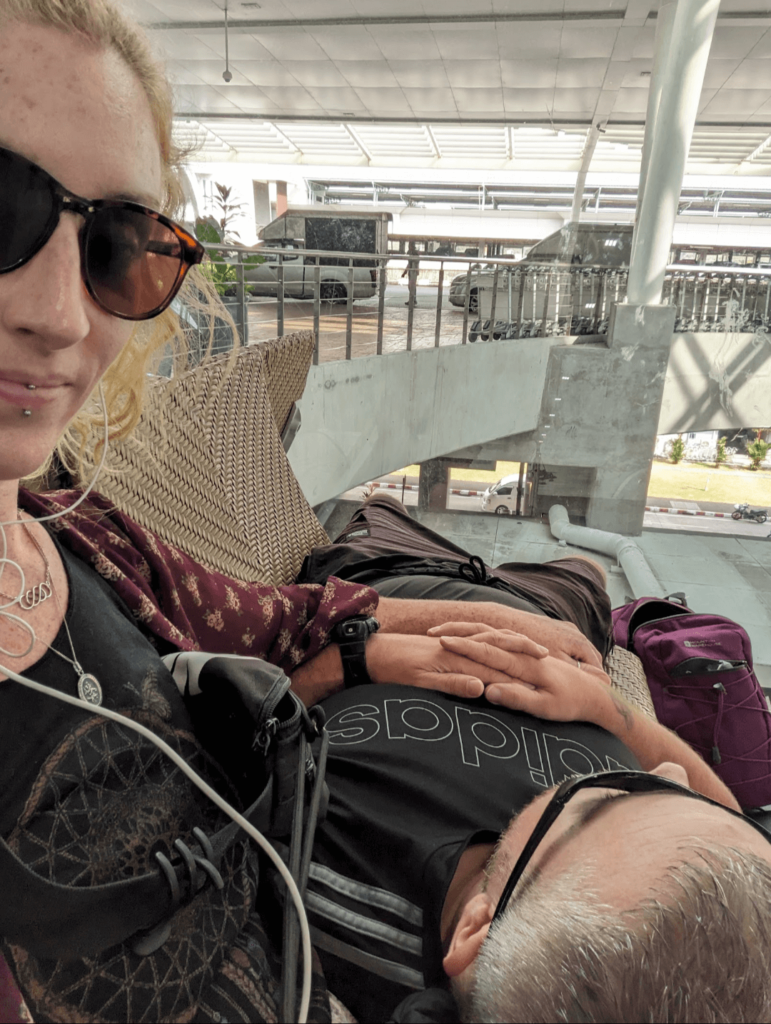
On the other hand, Kevin witnesses how I handle carrying around a heavy backpack in 50-degree heat as we wander in search of hotels, survive 20-plus hour bus journeys, and tough hikes, always greeting me with an encouraging “you’re a tough cookie Connolly!”. This little gift of encouragement is oh-so appreciated!!
How have you shown appreciation to your partner recently?
Maintaining a Routine
Maintaining a routine can prove difficult as a full-time travel couple. Especially with the constant change of rooms, cities, countries, currency, language, etc in our daily lives.
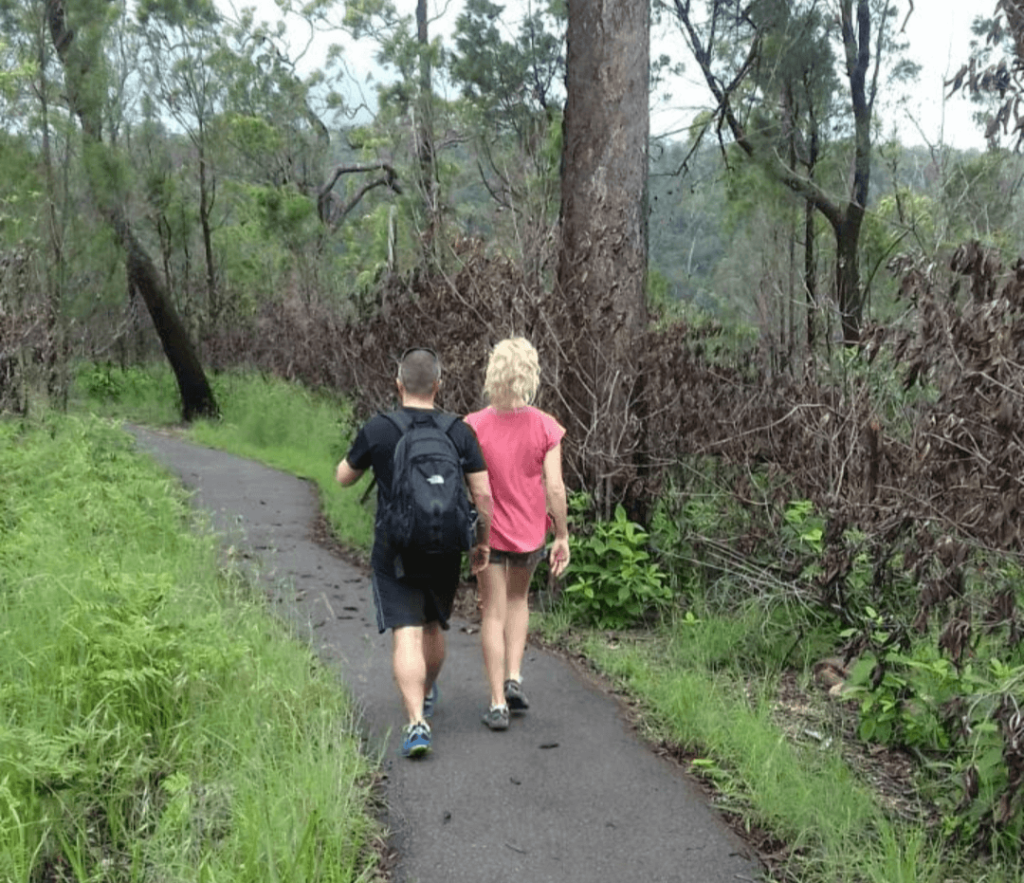
We always make sure to allow time together to have a coffee in the morning before we start our day, take a stroll in the evening, and watch a program together at night.
Whatever happens during the day can differ incredibly, however, it is quite important and reassuring to us that we can always have these moments together to connect in our relationship while traveling.
Do Something Nice For the Other Person
When you propose doing something nice, it means doing so without expecting anything in return for yourself.
Bring back their favorite chocolate bar from your visit to the shop, wash the other person’s socks that lay in the wash basket, offer the window seat, take the extra packing cube, for no reason other than that you know they will appreciate it.
After a long travel day, don’t underestimate the magnitude of kindness acts such as these.
Intimacy
Make time for intimacy. We all hear this advice, but do we actually do it?
Intimacy comes in many forms other than sexual intimacy – tickles, massage, hand holding, hugs, kissing.
Life as a full-time travel couple can get tiring and you can easily feel burnt out, leaving any desires for intimacy to fall into the background of your relationship while traveling.
If you feel that this is becoming an issue for your relationship during travel, then perhaps you need to reconsider your travel approach and take time to slow down.
I have already mentioned this above but no harm in offering this reminder again: This can be applied to work schedules, extra-curricular activities, training, kids’ routines, workload….the list is endless.
Prioritize your own well-being and nurture the love and connection you share with your partner.
Of course, if after reflection you are still choosing to spend your time and energy elsewhere than your relationship intimacy then that is a whole other conversation that needs to be addressed.
Extra Tips to Managing Conflict and Maintaining a Healthy Relationship While Traveling
It’s always nice to have some extra relationship tips in your pocket right? After all, there’s no limit to the amount of ways we can work on nourishing a healthy relationship while traveling.
So let’s check out some more of my favorites so you can give your relationship the best possible chance during your travels.
Gratefulness
Practicing gratefulness has many benefits to an individual’s overall well-being. Basically, it boosts self-esteem, increases happiness levels, and reduces symptoms of depression and anxiety.
How does it affect a relationship?
Fosters Appreciation: Practicing gratefulness encourages partners to acknowledge and value each other’s contributions, efforts, and qualities, which strengthens their bond.
Promotes Positivity: Gratitude shifts the focus from problems or shortcomings to the positives in the relationship, creating a more optimistic and uplifting atmosphere.
Enhances Communication: Expressing gratitude fosters open and positive communication, as partners feel more appreciated and validated in their actions and feelings.
Builds Resilience: Grateful couples tend to handle challenges and conflicts more constructively, as they approach problems with a mindset of appreciation and understanding.
Increases Relationship Satisfaction: Feeling appreciated and valued contributes to higher levels of satisfaction and happiness in the relationship, creating a fulfilling and supportive partnership.
Overall, practicing gratitude in relationships cultivates a deeper connection, strengthens emotional intimacy, and contributes to a harmonious and resilient partnership.
Our personal experience
I utilize a gratefulness App called Presently, it’s like a gratefulness journal. A “What are you grateful for today?” question box pops up on my phone at 8 pm every night.
This usually means Kevin and I are in wind-down mode and the perfect opportunity to reflect on this question. Don’t worry this does not have to be a prolonged discussion, and can be quick and easy answers, depending on the energy levels.

This is a lovely habit to end the day with a brief reflection on what we are grateful for and to learn about each other’s values
At the time of writing this article, we are on day 1245 day of gratefulness entries so I think a habit has most definitively been built at this stage!
Couple Quizzes
As mentioned earlier, we are fond of our playtime, and in particular a quiz or two!
Over the years we have purchased our fair share of couples quiz books and we would highly recommend such activities as a way of maintaining relationship connection while traveling.
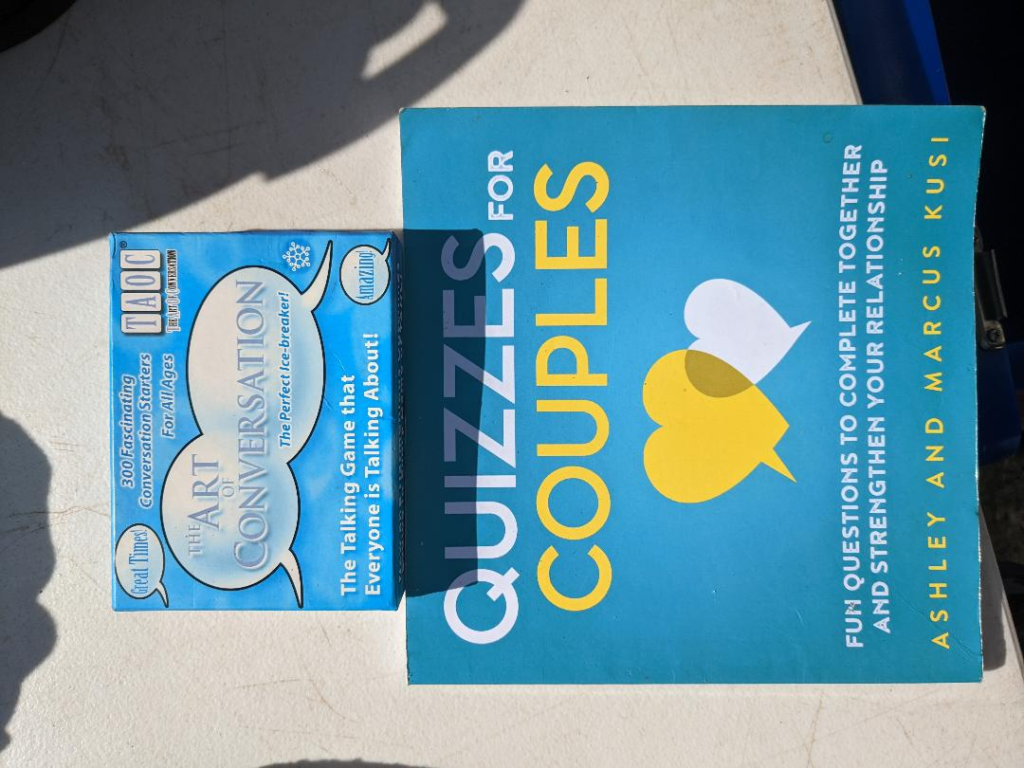
Couple quizzes can fall under the “play,” communication, and active listening categories. While traveling full-time and preferring not to carry books, we often choose to search for “couple quizzes” online for questions.
These activities are invaluable for deepening your understanding of each other. Even if you believe you already know everything, I encourage you to give them a try. You may be surprised.
Sometimes, we spend hours exploring a single question, delving deeper into its meaning, or uncovering new insights it may reveal.
We can almost guarantee you will let out such statements as “No way? I didn’t know that happened”, “What? I didn’t know you thought that”, or “Really? I didn’t think you would agree with that”. There is always something new to learn about your partner.
Exercise
Exercise can also be placed under the Mental Health extract. You may not have your gym membership while being a full-time travel couple, but that is no excuse not to exercise.
If exercise is something you highly value then it is your responsibility to find ways to exercise while traveling.
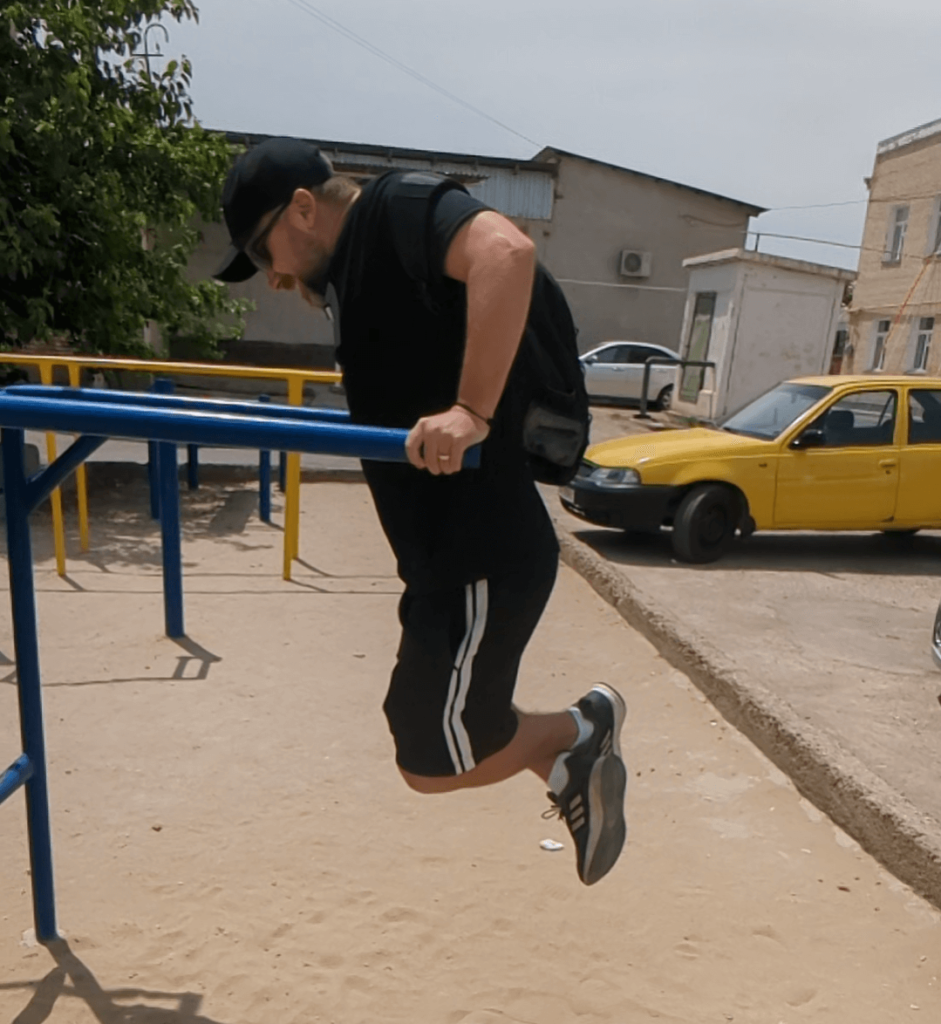
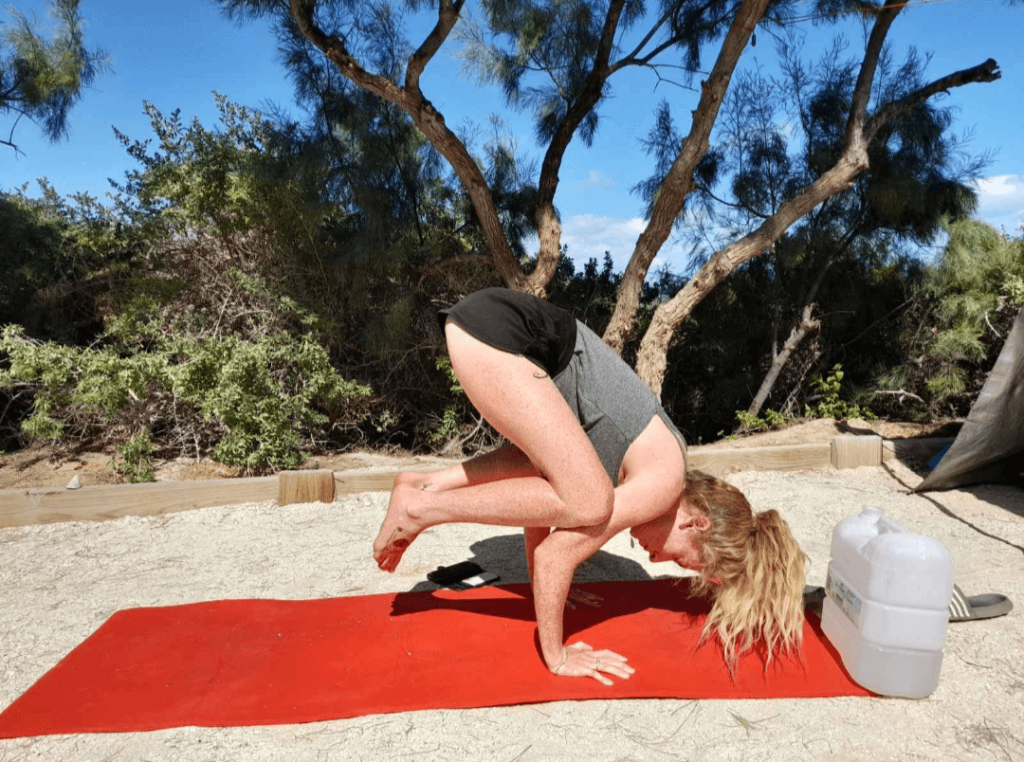
We are Happy Irish Wanderers so we choose to walk A LOT, and we are content with this. You still have outdoors, you still have bodyweight exercises, and you can always move. There is always space to do push-ups, sit-ups, planks, squats, and yoga if you need more.
A lot of places during our travels offer free outdoor gym equipment, or paid day passes in certain towns/cities so make sure to do your research if this is high on your priority list. It may even dictate where you travel to.
Maintaining a Healthy Relationship While Traveling Summary
What are your thoughts on the above strategies for managing conflict while traveling? Sometimes, we simply need to pause and reflect on what’s going well, what needs improvement, and which areas of our life require more attention.
Effective communication emerges as a consistent theme throughout the process of nurturing a healthy relationship while traveling. Sometimes, making small adjustments can break existing habits and set us on a new course.
Certain aspects of maintaining a healthy relationship while traveling may resonate with you more than others. Focus on those that are relevant and discuss them openly with your partner.
Above all, be patient as you implement these adjustments and practice self-compassion throughout. Remember, you’re rewiring your brain, so be gentle with yourself. If you encounter challenges, don’t hesitate to acknowledge and communicate them; this is where real growth happens.
If you’re finding it challenging to make time for intimacy, play, or communication, then ask yourself, what is going on here?
It’s important to recognize that healthy conflict is normal and beneficial – it fosters change and personal growth. Let’s all strive to improve our approach to handling it.
As mentioned earlier, the topic of maintaining healthy relationships while traveling is vast, with each point being worthy of a book (and indeed, there are books on these topics!)
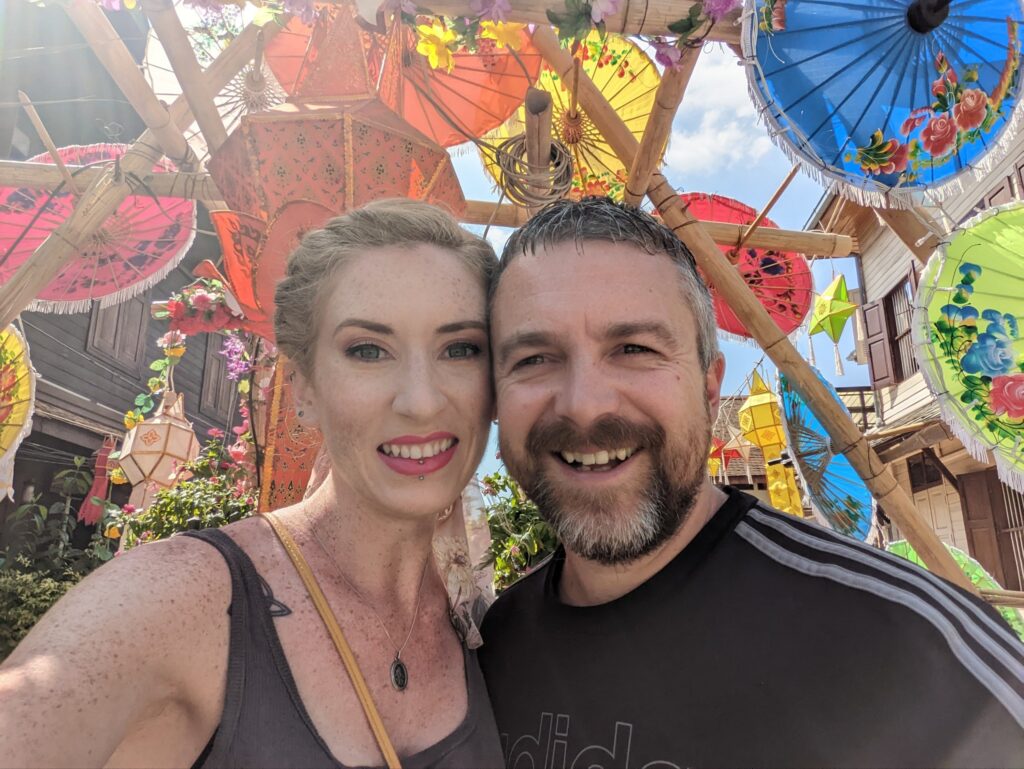
We would love to hear your thoughts on these relationship tips for travelers.
Have you tried any of these techniques before? What challenges do you face in maintaining healthy relationships while traveling, and what successes have you experienced?
If you have any effective methods for resolving arguments while traveling, we welcome you to share them.
Please feel free to leave us a message below or contact us through our socials.
Mind Yourself.
Slán go fóil


This post contains affiliate links. If you click on the links to make a purchase, we will earn a small commission. This is at NO EXTRA COST to you. This is a free way to support us and allow us to continue to create inspiring adventure travel guides.

